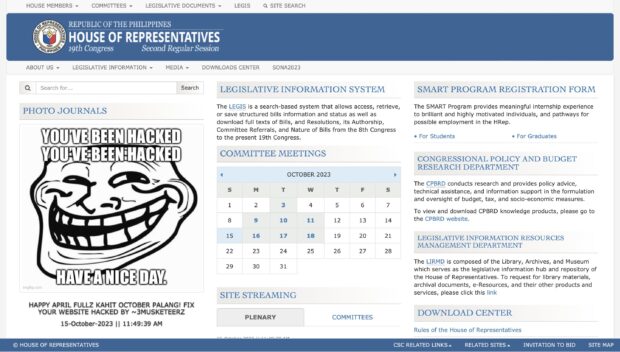
This photo shows the defaced website of the House of Representatives on Sunday, October 15, 2023. (Screen grab from the HOR website)
MANILA, Philippines — Another Philippine government website has been attacked by hackers.
The website of the House of Representatives was vandalized before noon Sunday by a group calling itself “3MUSKETEERZ.”
A troll face meme with the phrases “you’ve been hacked” and “have a nice day” was first published on the website. Below the troll’s face is the message, “Happy April Fullz Kahit October palang! Fix your Website.”
A few minutes later, the website of the House of Representatives became inaccessible.
The official social media pages of the lower chamber meanwhile were normally operating and accessible as of this writing.
The House of Representatives issued a statement addressing the incident two hours later.
It assured the public that it has taken prompt action and coordinated with concerned government agencies to address and probe into the matter.
“We wish to inform the public that the official website of the House of Representatives experienced unauthorized access earlier today. Immediate steps have been taken to address the issue, and we are working closely with the Department of Information and Communications Technology (DICT), Cybercrime Investigation and Coordinating Center (CICC), and law enforcement agencies concerned to investigate the matter,” the House of Representatives said.
“While we work to restore the website fully, we ask for patience and understanding. We are committed to ensure the security and integrity of our digital platforms, and we will implement additional measures to prevent such incidents in the future,” it added.
The House of Representatives also asked the public to be cautious about any suspicious emails or communications that claim to be from the lower chamber.
“We will keep the public updated as more information becomes available,” it said.
On September 22, a system of the Philippine Health Insurance Corporation (PhilHealth) was attacked preventing access for a week.
READ: Leaked members’ data unretrievable – PhilHealth
The data breach affected employees’ workstations and application servers, as well as users’ data, including names, addresses, date of birth, gender, phone numbers, and PhilHealth identification numbers, among other information.
The Department of Science and Technology’s OneExpert portal was also cyberattacked on August 31.
In a statement on October 13, the DOST assured that no personal data were compromised by the virtual assault.

